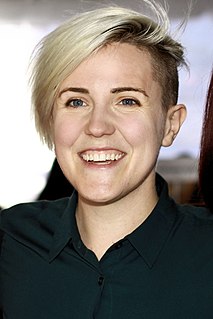A Quote by Jonathan Maberry
I wrote a novel, Ghost Road Rules, and as soon as it was done and polished, I began reaching out to agents. I ignored the frequent advice to 'shoot low and try for a low-level agent because they're the only ones that will take a flyer on a new author.' That sounded like bad advice to me.
Related Quotes
I try to stay level-headed and it's always the way I've been. Sometimes your personality out in the real world, you want to take that into your sport because that's where you feel comfortable. You never want to try to do something that's not you or you don't feel comfortable doing. That's where you get in trouble. It's the only way I've played sports and done things. I'm low-key, but I'm very competitive and hate to lose.
No matter what level you're starting at, it's about not only utilizing your time, but your resources and network. For me, I started my company with a small amount of savings; I never had investors and I was lucky in the sense that I had models and connections in the fashion industry who were willing to give me advice early on. So really, for anyone starting a new business, it's really important to seek out mentors and knowledge from those who have come before you. And to not let that be discouraging, but to take that advice and really learn from it and mold it to what you're trying to do.
There are peaks, there are valleys. But they're all kind of carved and smoothed out, and it feels like a low level of despair you live in. Where you're not getting any answers, but you're living OK. And you can smile at the office. You know? But it's a low level of despair. I was on Prozac for a long time. It may have helped me out of a jam for a little bit, but people stay on it forever. I had to get off at a certain point because I realized that, you know, everything's just OK.
My advice for finding a literary agent would be first, put your work out there as much as possible and hopefully someone will find you, because I still have literary agents writing to me after they find my site. You want someone who understands your work and is going to be your cheerleader from day one.



































